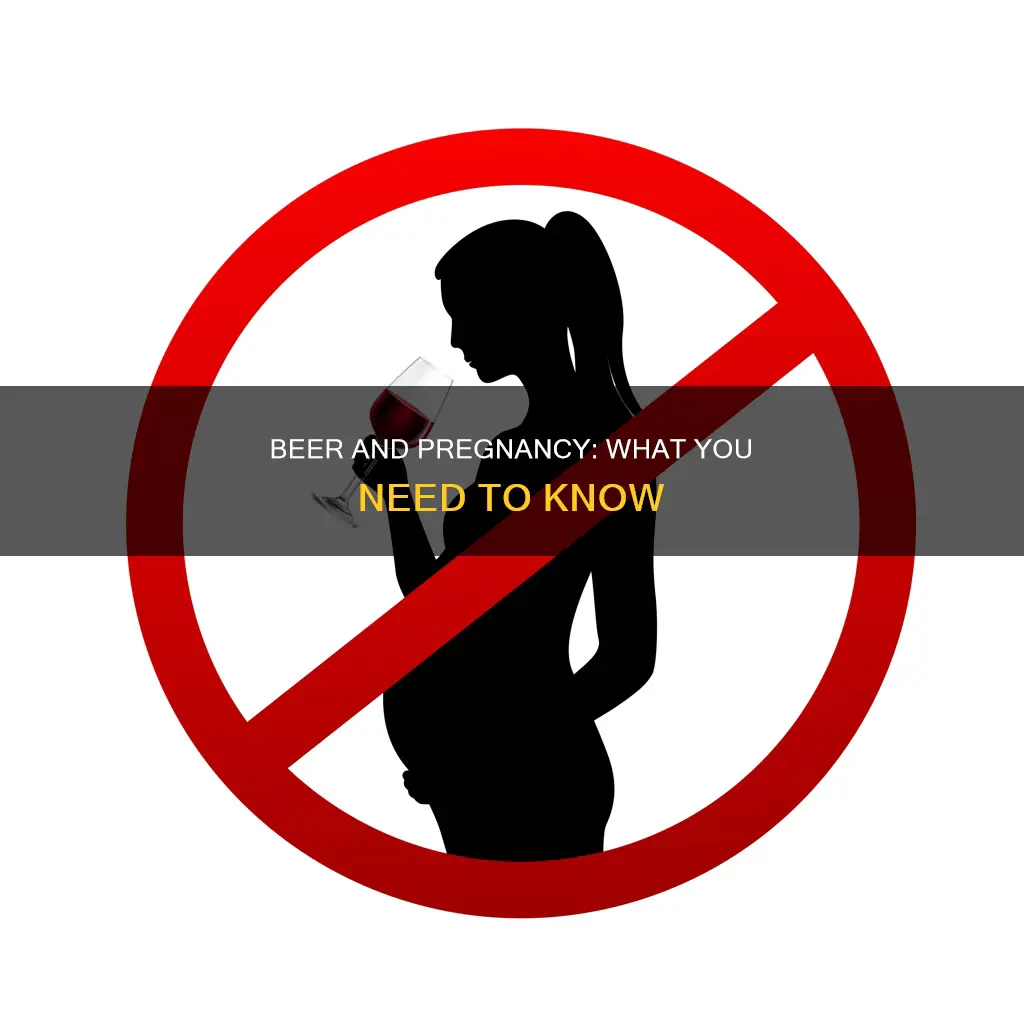
Drinking alcohol during pregnancy is a controversial topic, with some sources recommending complete abstinence, while others say the occasional drink is unlikely to be harmful. The consensus is that heavy drinking during pregnancy can cause birth defects and long-term harm to the baby, but the effects of light drinking are less clear. National health organizations and doctors generally advise pregnant women to avoid alcohol altogether, as there is no known safe amount of alcohol consumption during pregnancy. However, some studies suggest that low to moderate alcohol consumption during pregnancy may not have adverse effects on the baby, and occasional light drinking is a personal decision for some pregnant women.
| Characteristics | Values |
|---|---|
| Recommended amount of alcohol during pregnancy | It is recommended that pregnant women do not consume alcohol at all. |
| Effects of alcohol on the baby | Alcohol passes from the mother's blood through the placenta to the baby and can affect its development. The baby does not have a fully developed liver and cannot process alcohol. |
| Risks | Increased risk of miscarriage, premature birth, low birth weight, fetal alcohol spectrum disorder (FASD), and long-term harm to the baby. |
| Studies on alcohol consumption during pregnancy | Some studies suggest that light drinking during pregnancy may not be harmful to the baby, while others recommend total abstinence. |
| Support for reducing alcohol consumption | Confidential help and support are available from organizations such as Drinkaware, We Are With You, and Alcoholics Anonymous (AA). |
What You'll Learn
- Drinking beer while pregnant can cause fetal alcohol syndrome (FAS)
- There is no known safe amount of alcohol during pregnancy
- Drinking alcohol while pregnant can increase the risk of miscarriage
- Heavy drinkers are at greater risk of fetal alcohol syndrome
- Drinking alcohol while pregnant can cause long-term harm to the baby

Drinking beer while pregnant can cause fetal alcohol syndrome (FAS)
FASDs can cause a range of physical, behavioural, and learning problems. Children with FAS may have characteristic facial features such as a thin upper lip, small eye openings, and a flattened philtrum (the groove between the nose and upper lip). They may also be born prematurely and are often underweight, with poor growth.
The risk of FAS is likely greater the more a pregnant person drinks. Alcohol passes from the blood through the placenta to the baby and can seriously affect its development. The baby's liver is not fully developed, and it cannot process alcohol in the same way as an adult. Alcohol can interfere with the normal development of the fetus, particularly the brain and central nervous system, and can cause physical and mental defects.
FAS is preventable if the pregnant person does not drink any alcohol. It is recommended that pregnant people or those planning to become pregnant should not consume any alcohol to keep the risk to the baby to a minimum.
Beer and Basketball: A Match Made in Heaven?
You may want to see also

There is no known safe amount of alcohol during pregnancy
Drinking alcohol while pregnant is strongly discouraged by medical professionals. There is no known safe amount of alcohol consumption during pregnancy. Alcohol passes from the mother's blood through the placenta and umbilical cord to the baby, and can seriously affect its development.
Babies do not have a fully developed liver and cannot process alcohol. As a result, any alcohol consumed by the mother can remain in the baby's body for long periods of time. This can lead to a range of issues, including fetal alcohol spectrum disorder (FASD), which can cause problems with learning, behaviour, joints, bones, muscles, organs, managing emotions, and developing social skills.
Drinking alcohol during pregnancy has also been linked to an increased risk of miscarriage, premature birth, low birth weight, and stillbirth. The more alcohol consumed, the greater the risk of harm to the baby. Even small amounts of alcohol can cross over from the mother's body to the baby, and the exact level of alcohol exposure that can lead to harm is not known. Therefore, the safest option is to avoid alcohol completely during pregnancy.
While some studies suggest that small amounts of alcohol early in pregnancy may not be as risky as previously believed, the potential harm to the baby is still unknown. As a result, healthcare providers advise pregnant women to avoid drinking any amount of alcohol to minimise the risk to the baby.
If a woman drank alcohol before knowing she was pregnant, the risk of harm to the baby is likely to be low. However, it is important to stop drinking as soon as pregnancy is confirmed to ensure the healthiest outcome for the baby.
Gluten Intolerance and Beer: Is It Safe to Drink?
You may want to see also

Drinking alcohol while pregnant can increase the risk of miscarriage
Drinking alcohol while pregnant is generally not recommended by health professionals, as it can increase health risks for the baby, including the risk of miscarriage.
Miscarriage refers to a fetal loss occurring prior to 20 complete weeks of gestation. Alcohol consumption during pregnancy has been found to increase the risk of miscarriage, particularly for early miscarriages, which take place before 10 weeks of gestation.
Research suggests that drinking four or more drinks per week during pregnancy can significantly elevate the risk of miscarriage. Additionally, consuming spirits, such as liquor, has been associated with a higher likelihood of miscarriage compared to other types of alcohol. The specific congeners present in spirits may contribute to their increased toxicity and negative impact on the fetus.
While the occasional drink or minimal alcohol consumption during the first trimester may not significantly impact the risk of miscarriage, as evidenced by some studies, the overall consensus among health organizations is to abstain from alcohol entirely during pregnancy. This recommendation is based on the potential risks to the baby's development, including the possibility of fetal alcohol spectrum disorder (FASD) and other long-term health complications.
Ginger Beer Mixology: Creative Cocktails and Mocktails
You may want to see also

Heavy drinkers are at greater risk of fetal alcohol syndrome
Drinking alcohol while pregnant is strongly advised against by medical professionals. Alcohol passed through the bloodstream can reach the baby via the umbilical cord and placenta, and can seriously affect its development. The baby's undeveloped liver means it cannot process alcohol, and this can lead to long-term harm.
Heavy drinking during pregnancy can lead to a heightened risk of fetal alcohol syndrome (FAS). FAS is a permanent condition that can cause physical and mental defects in a baby. It is a severe form of fetal alcohol spectrum disorder (FASD), which is a group of disabilities that affect babies exposed to alcohol in the womb.
FAS can cause a range of issues, including problems with learning and behaviour, joints, bones, muscles, and organs, managing emotions, and developing social skills. Children with FAS may also have difficulty with hyperactivity and impulse control, and may experience problems with speech.
The more alcohol consumed during pregnancy, the greater the risk of FAS. Heavy drinking (approximately five drinks a day) can also lead to premature birth, with a heightened risk of preterm delivery in the second and third trimesters.
FAS is a lifelong condition with no cure. However, early treatment can help lessen the severity and improve the child's development. Treatment options include medication, behaviour and education therapy, and parental training.
Beer and Yeast Infections: What Men Should Know
You may want to see also

Drinking alcohol while pregnant can cause long-term harm to the baby
Babies cannot process alcohol as their livers are not fully developed. Any alcohol passed to a foetus can stay in their body for long periods and affect their development. The more alcohol consumed, the greater the risk to the baby. Heavy drinking during pregnancy has been linked to a long-term and irreversible condition known as fetal alcohol syndrome (FAS). Babies with FAS may be born prematurely and are often underweight. They may also have distinct facial features, such as a thin upper lip and small eye openings.
FAS can also cause problems with learning and behaviour, joints, bones, muscles and some organs, managing emotions and developing social skills, hyperactivity and impulse control, and communication, such as problems with speech. These issues can persist throughout a child's life and make school a difficult time.
Drinking during pregnancy can also increase the risk of miscarriage, premature birth, and the baby having a low birth weight. It can also affect the mother's health, increasing the risk of pregnancy-related high blood pressure disorders, which can lead to organ damage and failure, preterm birth, infant health issues, pregnancy loss, and stroke.
While some studies suggest that small amounts of alcohol during the first trimester may not be as harmful as previously believed, the exact level of alcohol exposure that can lead to harm is not known with certainty. Therefore, the safest option is to avoid alcohol completely during pregnancy or when trying to conceive.
Celiac Disease and Beer: What's Safe to Drink?
You may want to see also
Frequently asked questions
No, it is not recommended to drink beer or any other alcoholic beverage when pregnant. Drinking alcohol during pregnancy can lead to fetal alcohol spectrum disorder (FASD), which can cause problems with learning, behaviour, joints, bones, muscles, organs, managing emotions, and developing social skills.
FASD is a serious, life-long condition that can affect people whose mothers drank alcohol during pregnancy. FASD can cause problems with learning and behaviour, joints, bones, muscles and organs, managing emotions and developing social skills, hyperactivity and impulse control, and communication, such as problems with speech.
There is no known "safe" amount of alcohol use during pregnancy. Even small amounts of alcohol can affect a developing baby's brain. The more you drink, the greater the risk to your baby.
If you drank alcohol before knowing you were pregnant, it is recommended to stop drinking as soon as you find out. The sooner you stop drinking alcohol, the healthier your baby will be. You can also reach out to a doctor or midwife for advice and support.







